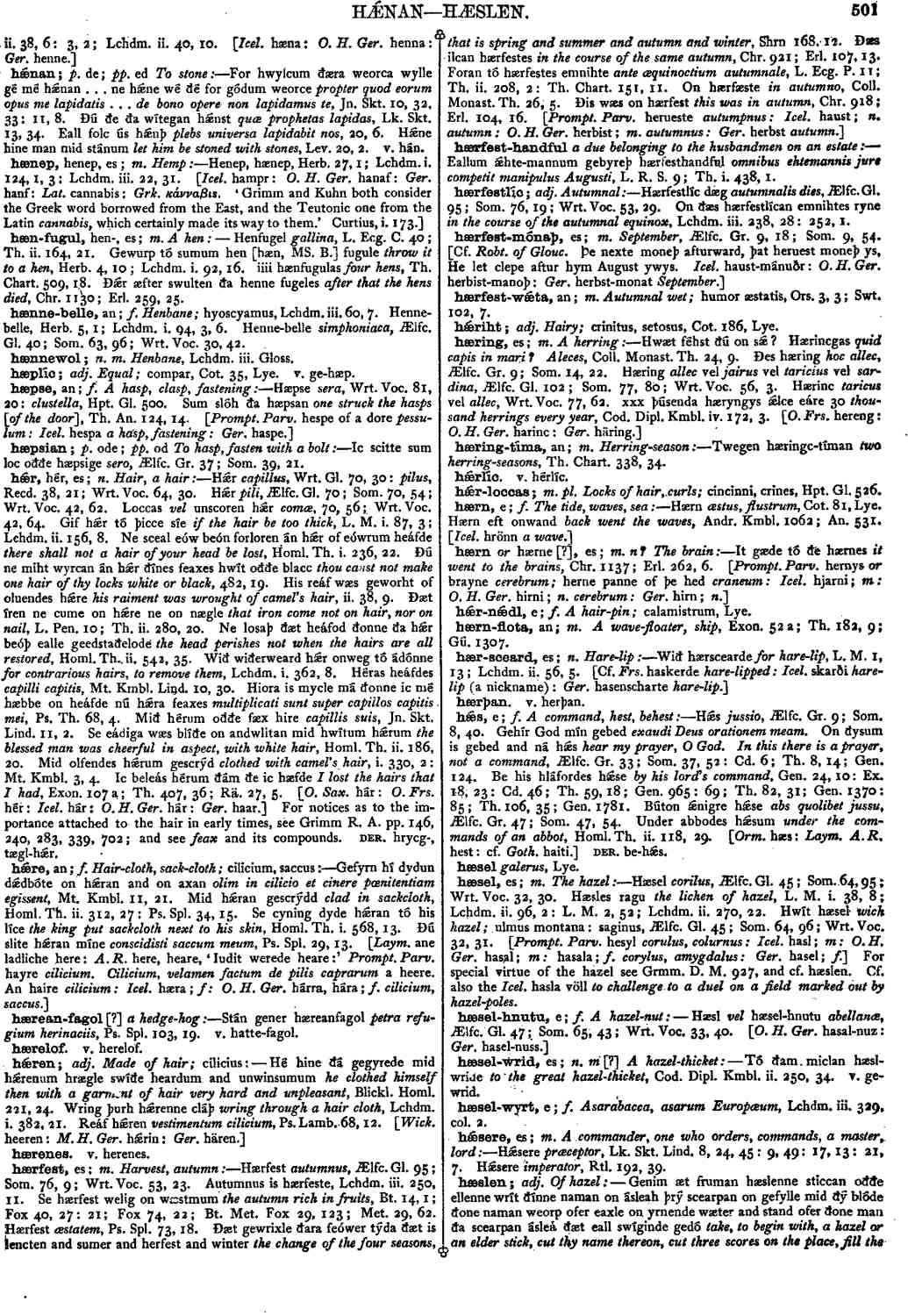hǽr
- noun [ neuter ]
-
Hǽr capillus, Wrt. Gl. 70, 30 :
pilus,
- Recd. 38, 21; Wrt. Voc. 64, 30.
-
Hǽr
pili,
- Ælfc. Gl. 70; Som. 70, 54; Wrt. Voc. 42, 62.
-
Loccas vel unscoren hǽr
comæ,
- 70, 56; Wrt. Voc. 42, 64.
-
Gif hǽr tó þicce síe
if the hair be too thick,
- L. M. i. 87, 3; Lchdm. ii. 156, 8.
-
Ne sceal eów beón forloren án hǽr of eówrum heáfde
there shall not a hair of your head be lost,
- Homl. Th. i. 236, 22.
-
Ðú ne miht wyrcan án hǽr ðínes feaxes hwít oððe blacc
thou canst not make one hair of thy locks white or black,
- 482, 19.
-
His reáf wæs geworht of oluendes hǽre
his raiment was wrought of camel's hair,
ii.- 38, 9.
-
Ðæt íren ne cume on hǽre ne on nægle
that iron come not on hair, nor on nail,
- L. Pen. 10; Th. ii. 280, 20.
-
Ne losaþ ðæt heáfod ðonne ða hǽr beóþ ealle geedstaðelodd
the head perishes not when the hairs are all restored,
- Homl. Th. ii. 542, 35.
-
Wið wiðerweard hǽr onweg tó ádónne
for contrarious hairs, to remove them,
- Lchdm. i. 362, 8.
-
Héras heáfdes
capilli capitis,
- Mt. Kmbl. Lind. 10, 30.
-
Hiora is mycle má ðonne ic mé hæbbe on heáfde nú hǽra feaxes
multiplicati sunt super capillos capitis mei,
- Ps. Th. 68, 4.
-
Mid hérum oððe fæx hire
capillis suis,
- Jn. Skt. Lind. 11, 2.
-
Se eádiga wæs blíðe on andwlitan mid hwítum hǽrum
the blessed man was cheerful in aspect, with white hair,
- Homl. Th. ii. 186, 20.
-
Mid olfendes hǽrum gescrýd
clothed with camel's hair,
i.- 330,
2 : Mt. Kmbl. 3, 4.
-
Ic beleás hérum ðám ðe ic hæfde I lost the hairs that I had, Exon. 107 a; Th. 407, 36; Rä. 27, 5. [O. Sax. hár : O. Frs. hér : Icel. her : O. H. Ger. hár :
Ger.
haar.] For notices as to the importance attached to the hair in early times, see Grimm R. A. pp. 146, 240, 283, 339, 702; and see feax and its compounds.
Bosworth, Joseph. “hǽr.” In An Anglo-Saxon Dictionary Online, edited by Thomas Northcote Toller, Christ Sean, and Ondřej Tichy. Prague: Faculty of Arts, Charles University, 2014. https://bosworthtoller.com/17928.
Checked: 0